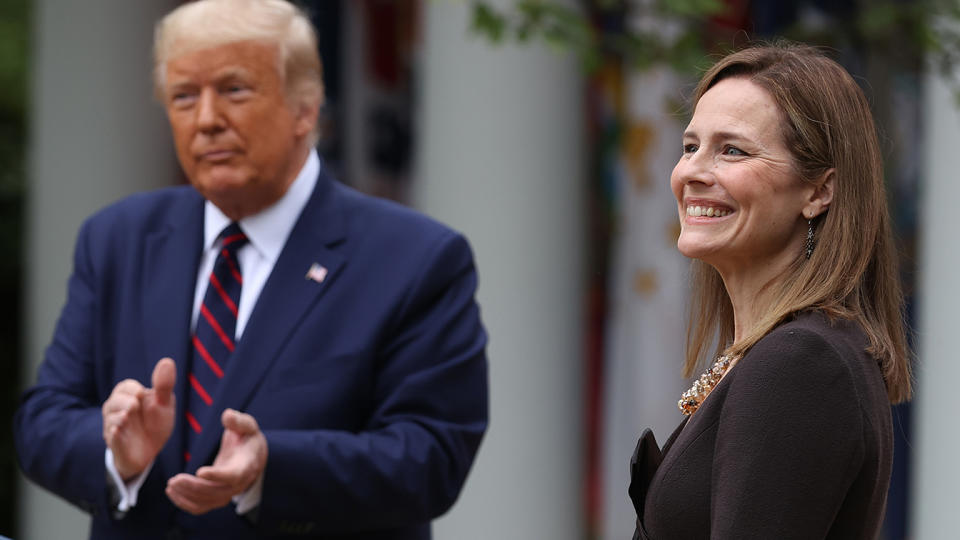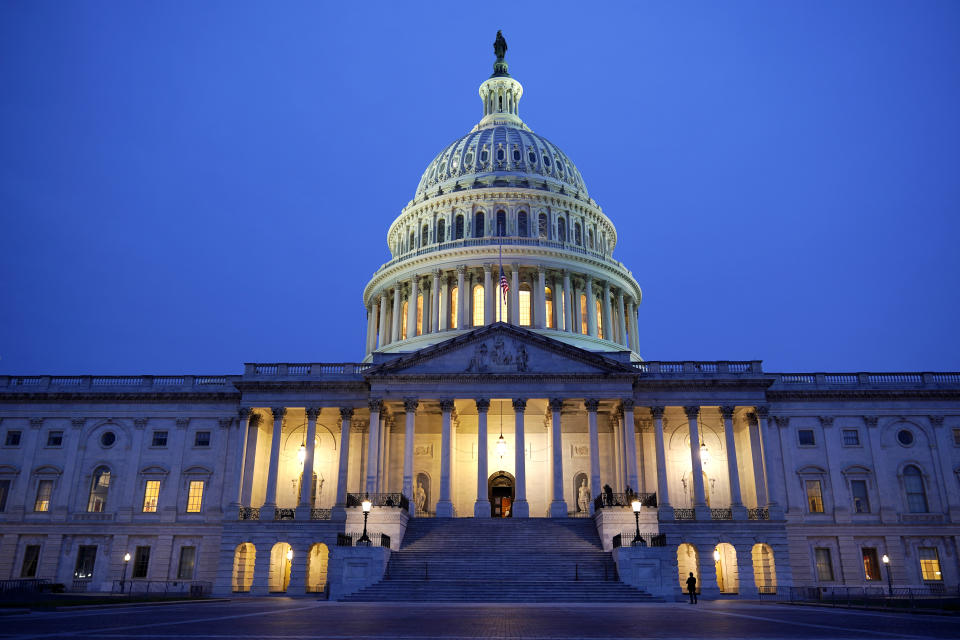Trump names Amy Coney Barrett as his 3rd Supreme Court pick
WASHINGTON — President Trump on Saturday announced that he is nominating Amy Coney Barrett to fill the Supreme Court seat left vacant when Justice Ruth Bader Ginsburg died on Sept. 18. The move was the first step in a rapid confirmation push aimed at having Barrett seated before the presidential election. If confirmed, she is likely to cement a conservative majority on the nation’s highest court for years to come.
Trump unveiled his choice, which was widely expected, to an audience of about 200 people in the White House Rose Garden.
“Today it is my honor to nominate one of our nation’s most brilliant and gifted legal minds to the Supreme Court,” Trump said. “She is a woman of unparalleled achievement, towering intellect, sterling credentials and unyielding loyalty to the Constitution, Judge Amy Coney Barrett.”
Trump described the nomination as one of his “highest and most important duties” and a “very proud moment indeed.” He also praised Ginsburg as a “legal giant” and a “pioneer for women.” The president was accompanied to the podium by his wife, Melania. Barrett was joined by her husband and their seven children. As they walked onto the stage, the crowd of assembled VIPs that included Attorney General William Barr cheered.
Following Trump’s remarks, Barrett spoke to the crowd, describing herself as “deeply honored” by the selection.
“I fully understand that this is a momentous decision for a president, and if the Senate does me the honor of confirming me, I pledge to discharge the responsibilities of this job to the very best of my ability,” she said. “I love the United States, and I love the United States Constitution.”
Barrett went on to praise Ginsburg’s work breaking “glass ceilings” that prevented women from succeeding in the legal profession, and spoke about her own family.
“While I am a judge, I’m better known back home as a room parent, carpool driver and birthday party planner,” she said. “When schools went remote last spring, I tried on another hat. [My husband] Jesse and I became co-principals of the Barrett e-learning academy.”

Barrett, 48, is currently a judge on the U.S. Court of Appeals for the Seventh Circuit, which has jurisdiction over a large swath of the Midwest. A native of Louisiana, she received her undergraduate degree from Rhodes College and her law degree from Notre Dame, where she went on to teach. In the late 1990s she clerked for Supreme Court Justice Antonin Scalia, who was a leading figure in conservative legal circles prior to his death in 2016.
As he introduced Barrett in the Rose Garden, Trump noted that Scalia’s wife, Maureen, was in the crowd along with their son, the current Secretary of Labor Eugene Scalia. “Very good genes in that family, I will say,” Trump quipped.
Trump, who nominated Barrett to the federal judiciary in 2017, went on to tout her achievements. “You are going to be fantastic,” he said to her. “Really fantastic.”
He went on to note Barrett’s devotion to her family, including “two beautiful children” she adopted from Haiti. “If confirmed, Justice Barrett will make history as the first mother of school-age children ever to serve on the U.S. Supreme Court,” Trump said, adding, “That’s good.”
The president went on to predict that she would “decide cases based on the text of the Constitution as written.”
Like her mentor, Scalia, Barrett has earned a reputation as an originalist, someone who favors strict adherence to the Constitution. She has also drawn attention for her religious views, which became an issue during her confirmation to the appeals court. She is a member of a self-described charismatic Christian group called People of Praise, which includes both Roman Catholics and Pentecostals. The group refers to female members as “handmaids.”
A devout Catholic, Barrett faced questions from Democrats about whether her beliefs might influence her decisions on the bench when she joined the federal judiciary in 2017. She has repeatedly insisted that religious and political concerns would not sway her judgments. Nevertheless, liberal groups have pointed to her past commentary as evidence she could seek to erode LGBTQ rights or overturn Roe v. Wade as a Supreme Court justice. On Friday evening, as reports emerged that Trump had selected Barrett, the LGBTQ advocacy group Human Rights Campaign released a statement blasting her selection.

“Amy Coney Barrett’s history tells a story of anti-LGBTQ ideology, opposing basic rights thought to be settled law, and an anti-choice ideology out of step with popular opinion,” the statement said.
HRC cited past comments Barrett made criticizing the decision in Obergefell v. Hodges, a 2015 case in which the Supreme Court ruled that same-sex marriage was a fundamental right. Barrett has suggested that the question of same-sex marriage should be left to individual states. HRC also pointed to comments Barrett made describing Roe v. Wade, the 1973 decision that protected abortion rights, as an “erroneous” ruling.
Conservatives have criticized questions about Barrett’s religion, and the potential that it might motivate her to seek to change existing precedents, as anti-Catholic bigotry. In a statement released on Thursday, the Christian activist group Family Research Council accused liberals of engaging in an “anti-Christian smear campaign.”
“The startling level of anti-Christian bias already on display against Barrett reveals how far outside of the mainstream the Left has become and how determined they are to oppose whoever President Trump nominates to fill this vacancy,” FRC president President Tony Perkins said.
Barrett’s confirmation is also likely to be contentious since the timing of her nomination directly conflicts with past statements Senate Majority Leader Mitch McConnell and other Republicans have made about replacing a Supreme Court justice in the period leading up to a presidential election.
In 2016, after Scalia’s death, Democratic President Barack Obama nominated Merrick Garland as Scalia’s replacement, which would have meant liberals would have gained a slim majority on the court. At the time, it was about 10 months prior to the presidential election, and McConnell refused to allow a confirmation vote for Garland on the grounds that it would be inappropriate to allow a new justice to be selected before Americans chose a new president.
Hours after Ginsburg’s passing, McConnell reversed course and indicated he would allow a vote on a Trump nominee even though, at the time, only about six weeks remained until the election. In the days since, multiple Republicans who previously indicated they agreed with the precedent that became known as the “McConnell rule” also backtracked and changed their positions.
McConnell’s decision to block Garland allowed Trump to fill the seat with Neil Gorsuch in 2017. Trump also confirmed Brett Kavanaugh the following year. If Barrett is confirmed, it will mean Trump will have appointed three justices, leaving conservatives with a solid, generational majority.
However, some Democrats have already begun fighting Barrett. On Friday evening, following multiple reports that Trump planned to nominate her, Massachusetts Sen. Elizabeth Warren, a former presidential candidate, tweeted that the Senate minority should not allow Barrett to be confirmed.
“No confirmation before the inauguration,” Warren wrote.

Republicans have countered that it is necessary to have a full nine-member Supreme Court prior to the election to prevent a potential tie on the bench in the event the presidential race comes down to a court decision.
“One of the biggest reason we will confirm the nominee BEFORE Election Day is to ensure a full 9-Justice majority to resolve any (inevitable) election disputes. Dems desperately, desperately don’t want that,” Texas Sen. Ted Cruz tweeted on Saturday.
Like many of his colleagues, Cruz had the opposite view in the waning days of Obama’s presidency.
As he introduced Barrett in the Rose Garden, Trump alluded to the coming confirmation fight. He pointed to senators in the audience and declared that it “should be a straightforward and prompt confirmation.”
“It should be very easy,” Trump said. “Good luck. It’s going to be very quick. I’m sure it will be extremely noncontroversial.”
Despite the uproar, it appears unlikely Democrats have the votes to block Barrett’s nomination. Due to the Republican majority, four senators would need to cross party lines to prevent her from taking the bench. So far only two, Alaska’s Lisa Murkowski and Maine’s Susan Collins, have indicated they might not vote for Barrett’s confirmation. The pair both echoed McConnell’s past concerns about holding a confirmation near an election.
Some liberals have suggested Democrats might be able to use procedural maneuvers to block Barrett’s nomination. On Friday, progressive writer David Sirota reported that a memo making the rounds on Capitol Hill encouraged Democrats to delay confirmation hearings until after the election by having their House majority propose measures that would take precedence on the Senate floor, among other things.
But others have rejected the notion that Democrats have a path to blocking Barrett without earning votes from across the aisle. In an interview with Yahoo News’ “Skullduggery” podcast, Sen. Sheldon Whitehouse, a Rhode Island Democrat who is on the Senate Judiciary Committee, rejected the notion that the opposition party could thwart a Trump nominee who has enough Republican backing.
“If there were some triple-secret procedural trick that we could pull, we would have been pretty negligent in not pulling it in those two earlier proceedings,” Whitehouse said.
_____
Read more from Yahoo News:

